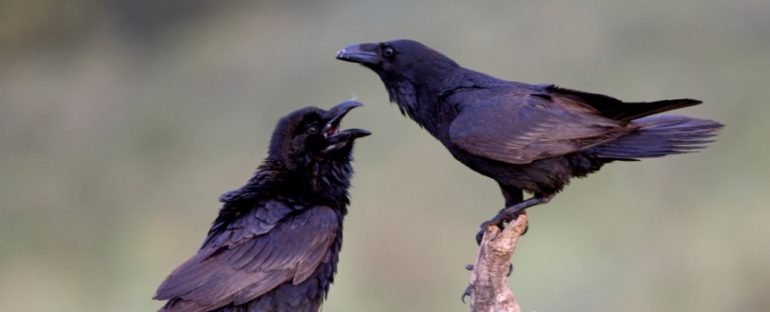It’s safe to say if there was a Mensa for animals, corvids would be crowing about it. They can plan like us, make tools like us, and might even be consciously judging us for all we know. We get it, they’re super smart.
Just to rub it in, there’s now evidence that their cognitive development might even be a little quicker than ours. Hand-raised common ravens (Corvus corax) have all their mental skills by just four months of age, all without watching a single episode of Sesame Street.
Researchers from the Max Planck Institutes for Ornithology and Evolutionary Anthropology in Germany ran eight ravens in their care through a modified version of the Primate Cognition Test Battery (PCTB) every four months since hatching.
This series of tests doesn’t just examine ‘thinking’ skills to do with spatial relationships, object permanence, causality, and tool use – it deals with social abilities, communication, and theory of mind.
They compared the birds’ results with data gathered previously on primates, including results on chimpanzees (Pan troglodytes) and orangutans (Pongo pygmaeus), as well as parrots.
They found by just four months of age, the ravens already had the social and other cognitive skills expected of an adult raven. This is in spite of having a brain that wasn’t yet fully grown.
Since these skills are comparable with those of a great apes’, it means ravens that are barely able to fly can already solve problems that would make an orangutan scratch its head in deep thought.
When human children are put through their paces in the PCTB, they usually run rings around their great ape relatives. At least, as far as the social components go.
But in the 6 million-odd years that separate humans and chimps in evolutionary terms, we haven’t really accelerated in our development of other cognitive skills, such as spatial memory and an ability to recognise relative amounts. Comparisons between toddler humans and infant chimps show we’re neck-and-neck as far as our general ‘mental machinery‘ goes in the formative years.
This implies our ancestors got a mental boost in sociocultural development soon after we evolved an ability to stand upright. Early humans put their energy into quickly growing the neurology required to communicate and comprehend another’s intentions, instead of making babies better at comparing volumes or manipulating tools.
Given such distinctions appear in species as closely related as chimpanzees and Homo sapiens, how other highly intelligent animals compare has remained an open and intriguing question.
Since nobody had gathered much information on the cognitive development of corvids, the field has been begging to be studied.
When age was taken into account for each set of skills, there was no real difference between birds that were four months and those that were 16 months.
Each, on average, performed best in the quantitative domains of the test, and fared the worst in the spatial components. To the surprise of the researchers, however, the ravens’ physical and social smarts weren’t really all that different between the ages.
Maybe a test designed for primates isn’t sharp enough to pick up subtle distinctions in bird behaviour. But tests carried out by other researchers on parrots using the PCTB failed to show similar cognitive talent compared to that of ravens, which is surprising given observations that would appear to challenge such a result.
It could also be possible that differences appear before four months or after 16 months, or maybe a sample of eight ravens is just too small to come to any clear conclusions.
With that in mind, we might simply have evidence of ravens prioritising their social skills much as we do, developing them early with other cognitive abilities.
Putting aside their limited talent for making sense of spaces, comparisons between the ravens’ scores and those of apes were remarkably similar. Social and cognitive abilities – even among the four month old birds – were comparable.
Maybe none of this should surprise us. Not only do we know corvids are smart, we also know they have complex social lives, sharing emotional states and vying for resources.
“Since ravens’ and other corvids’ social life is highly competitive, all aspects of their cognitive abilities have likely been shaped by the need to out-compete conspecifics in general,” the researchers suggest in their report.
Give it a few million years of evolution, we humans could be the ones picking up their garbage.
This research was published in Nature.



